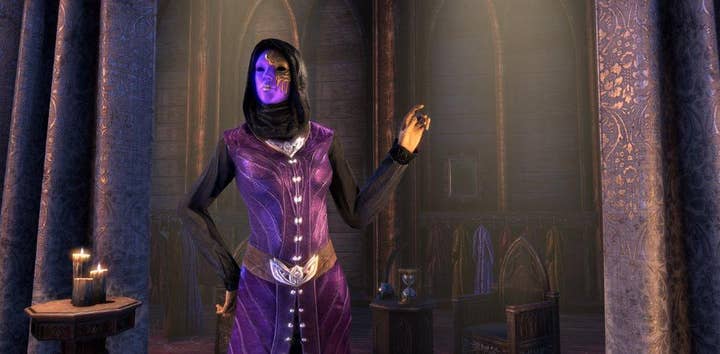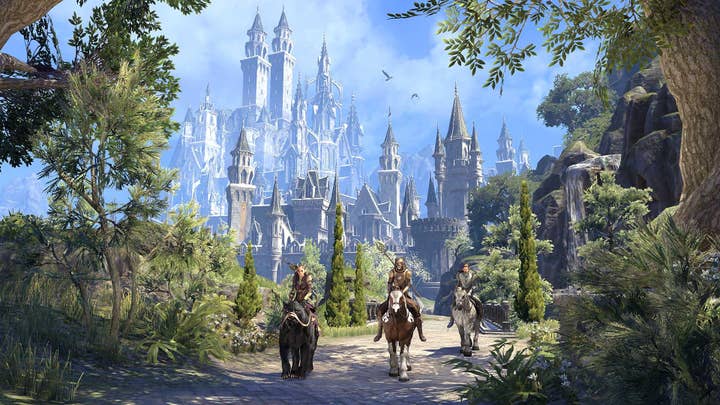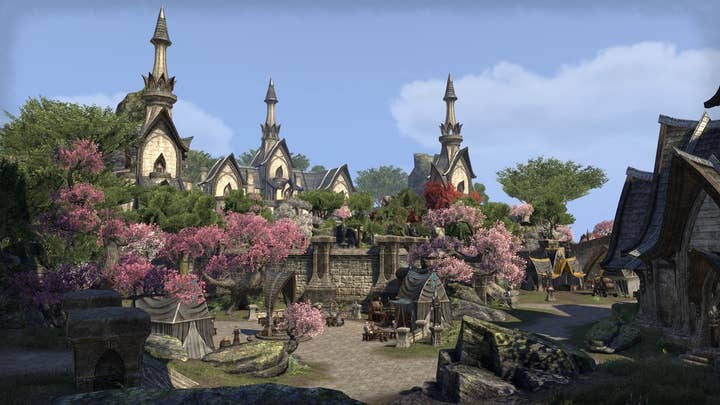The four pillars of good representation
GDC 2020: Proletariat's Tori Schafer offers key considerations for studios including LGBT+ representation in their games
Last year, LGBTQ advocacy organization GLAAD awarded The Elder Scrolls Online's Summerset expansion its inaugural award for Outstanding Video Game, celebrating "outstanding LGBTQ-inclusive content."
The quest at the heart of it, "Manor of Masques," tells the story of a transgender woman named Alchemy, who rejects a life as a mage and scholar to join a theatre troupe. In it, the player is sent by Alchemy's sister -- initially unaware of her transition -- to tell the estranged sibling she wants to reconnect. It concludes with the two reuniting, and Alchemy's sister accepting her for who she is.
Tori Schafer, one of the designers behind the quest, has also contributed to LGBTQ representation in another game: Backbone. In EggNut's noir adventure starring an anthropomorphic raccoon detective, the player encounters a lesbian woman named Sophia who has been rejected by society and her family as a result of Backbone's bigoted cultural setting. It's a stark contrast to Summerset's culture of acceptance.
But as Schafer discussed in her GDC 2020 talk "Representing LGBT+ Characters in Games: Two Case Studies," it's possible to tell both kinds of stories while remaining respectful of real LGBTQ people and communities. To that end, she described four pillars that developers should aim to follow when designing representation of all kinds, though her talk focused on LGBT+ characters and stories specifically.

Realistic
The first question developers should ask themselves when portraying LGBT+ characters is if their portrayal is accurate.
"[Make sure] it's a portrayal that avoids stereotypes and makes sure that the character isn't defined by their sexuality or gender," Schafer said. "This is helped by research, making sure that game developers who are working on this kind of content are as diverse as possible, and also consuming community-approved LGBT+ media -- things that have had a positive response from the LGBT+ community -- and making sure that you understand the types of identities you're representing."
Considerate
"Is the narrative considerate of past and current LGBT+ issues? Make sure characters aren't inherently bad because of their sexuality or gender. The narrative shouldn't punish a character because of their identity, even if the society that character is a part of does... How is the narrative treating this character? What is the message the narrative is giving to the player about this character and their identity?"
"The narrative shouldn't punish a character because of their identity, even if the society that character is a part of does"
Explicit
"Are characters explicitly stated to be LGBT+? Do they openly say their identity, or openly talk about their identity's experiences?
"But you have to be mindful of doing this without the character's consent -- having other characters reveal a character's identity is something you want to avoid both in games and in real life, making sure that you have the consent of that individual, that their identity can be talked about or shown. The best way to do that is to make sure the character is the one telling the player who they are and what their identity is."
Respectful
"Is the character's identity respected by the narrative? Make sure that the character's identity is never the butt of a joke. You can have these characters be funny. You can have these characters make jokes. But not in a stereotypical, harmful way. You have to be respectful of the LGBT+ community and their experiences and make sure you're not relying on those harmful things.
"And [you should be] respectful to the community on social media. Make sure that on social media your studio and your developers are not making harmful jokes or comments about the LGBT+ community, and are being mindful about how that community reacts to and interprets your characters and stories.
"If someone has a headcanon that a character identifies a certain way, or two characters have a certain kind of relationship, make sure you respect that. Because that is how that player is choosing to consume your content so that they are represented, and make sure you never feel like they're wrong or lesser for doing so."

At one point during the talk, a viewer in the Twitch chat asked how developers can pitch LGBT+ narratives to their teams successfully for inclusion in larger projects.
"I think that having a broader talk about how your studio or team feels about these narratives needs to happen first," Schafer replied. "Make sure everyone is on the same page, or that you're coming from the right angle that your studio/team cares about.
"From there you can discuss it as a moral obligation, something that can grab the attention of more players, etc. Or just something you feel passionate about. Saying how much it means to you to create those stories can go a long way."
"Leads need to be the ones to say, 'Let's make sure we're creating a diverse cast and a diverse story'"
Another user asked how Schafer felt about games that offer LGBT+ characters as romance options, particularly when it comes to the issue of either all characters being available for relationships with protagonists of any gender, versus locking some characters out as options for certain genders.
"I think that it's important to a lot of people to see that the characters reflect their sexuality in realistic ways, but it also can be limiting to players who may want to romance same-sex characters, so it's a very tricky subject to be honest," Schafer said. "I don't know if I have the right answer, but I think it's more something you have to talk about with your team and decide what's best for your game, and something you should be cognizant of."
Schafer advised that developers do extensive research ahead of time to ensure representation remains respectful, recommending diversity readers and organizations such as GLAAD, GaymerX, and Queerly Represent Me as potential resources. She also advocated for studio initiatives to create diverse representation, led by those at the top.
"Leads need to be the ones to say, 'Let's make sure we're creating a diverse cast and a diverse story'. They need to be supporting designers who want to create that representation: giving them the time to research, giving them the resources needed, making sure they're positive about that initiative."
Finally, Schafer urged developers to push for representation even if they feel apprehensive about not getting things exactly right.
"LGBT+ characters and narratives deserve a place in games," she said. "They deserve to be represented, and representation does not need to be perfect to be respectful. You're going to have hitches within your gameplay, within your narrative, and you're just going to have to use as much of those pillars as you can to ensure that, even though there might be some issues, overall you're giving a respectful story for this character to be a part of.
"And fans will respond positively to respectful representation. I know it can be scary, because when you get it wrong, the LGBT+ community is really upset. But you've got to know that when you try to put yourself out there and create that diverse representation, you will get a lot of excitement."

